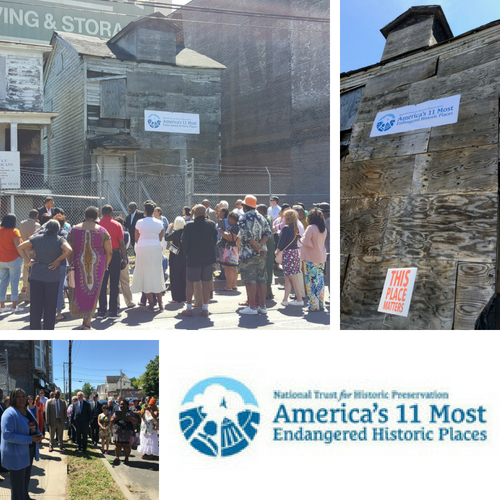On June 26, 2018, Bridgeport’s Mary and Eliza Freeman Houses were designated one of “America’s 11 Most Endangered Historic Places” by the National Trust for Historic Preservation. Located in the city’s South End and built in 1848, the houses are rare and irreplaceable evidence of African American life prior to Emancipation. This marks the state’s third “11 Most” designation in the national program’s 30 years.
“Mary and Eliza Freeman and their community of Little Liberia persevered in the face of seemingly insurmountable odds and achieved prosperity at a time when 90 percent of the nation’s black population was enslaved,” said Stephanie Meeks, president and CEO of the National Trust for Historic Preservation. “We hope that by naming the Freeman Houses to our ‘11 Most Endangered Historic Places’ list we can help protect these historic homes as an enduring symbol of African American achievement in Connecticut and beyond.”
CT Humanities has awarded a $9,999 capacity grant to the Freeman Houses for the organization to create its first-ever strategic plan and to digitally store and preserve its institutional records. These are integral first steps to capturing and preserving key elements of the community’s history and exposing it to a global audience.
“This is one of the most important untold Connecticut stories – with national significance,” said Jason Mancini, executive director of CT Humanities. “The Freeman Houses’ histories are significant to our state’s early diversity, and are relevant to historical and contemporary economic, social and political disparities that exist within Connecticut’s and America’s wealthiest regions. We’re pleased to award this grant and fuel awareness for the Freeman Houses on a national, even global, scale.”
“More than anything, these houses tell the story of a multi-ethnic community of color that opened its doors to free and formerly enslaved people from throughout the Atlantic world and challenged the very definitions of freedom in the antebellum North,” said Jane Montanaro, co-director of Conn. Trust. “The grant from CT Humanities and recognition by the National Trust for Historic Preservation as one of the nation’s 11 most important endangered buildings will support the Freeman Center in realizing its dual vision of both restoring the houses and ultimately revitalizing the surrounding block.”
“We realized early on that it was actually going to take a movement to keep these houses in place, and this movement has been sustained by myriad supporters from community partners, south-end residents, scholars, and local historians and activists,” said Maisa Tisdale, president of the Mary & Eliza Freeman Center for History and Community, Inc. “This project is not simply about creating a historic house museum, but about reimagining an entire neighborhood outside of its present contexts. The newly awarded grant from CT Humanities and the long-standing support of CT Trust will go a long way in ensuring that the Freeman Houses and their legacies of freedom, entrepreneurship and community investment remain in place for years to come.”









